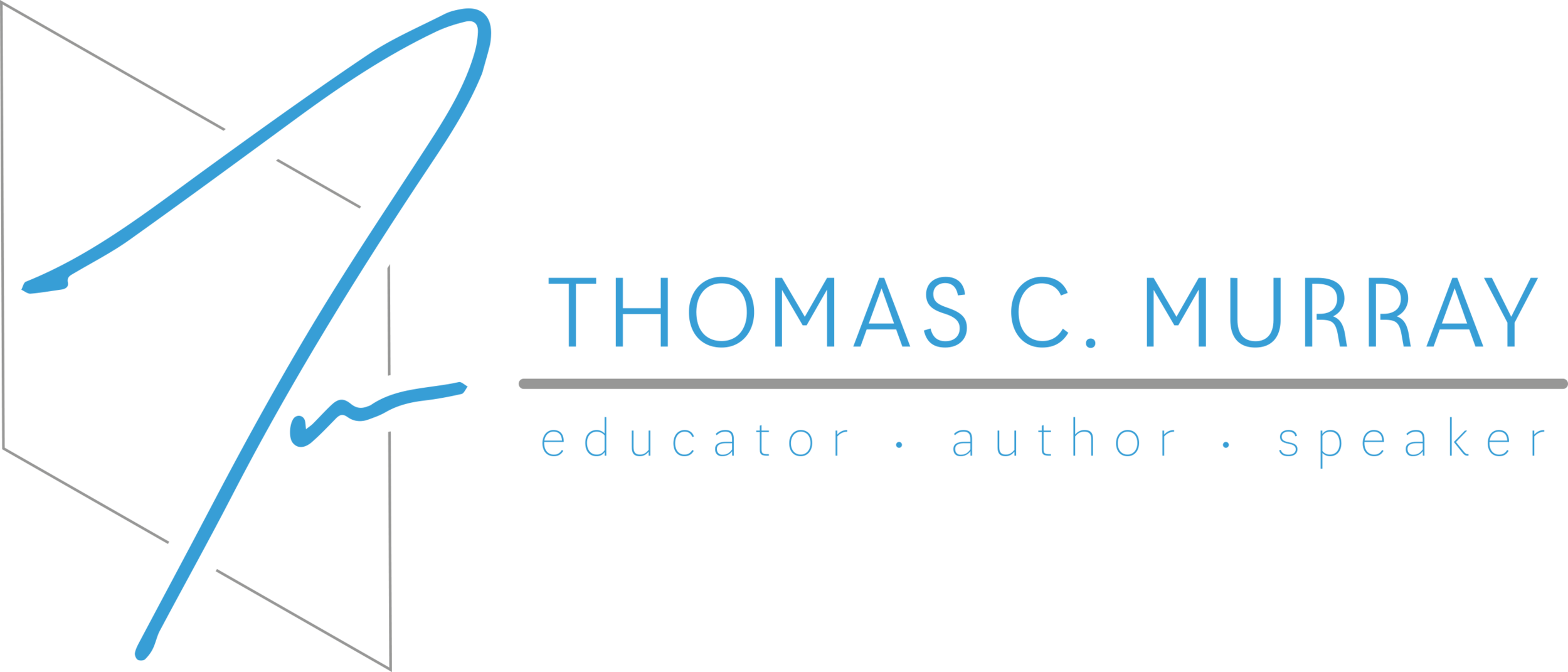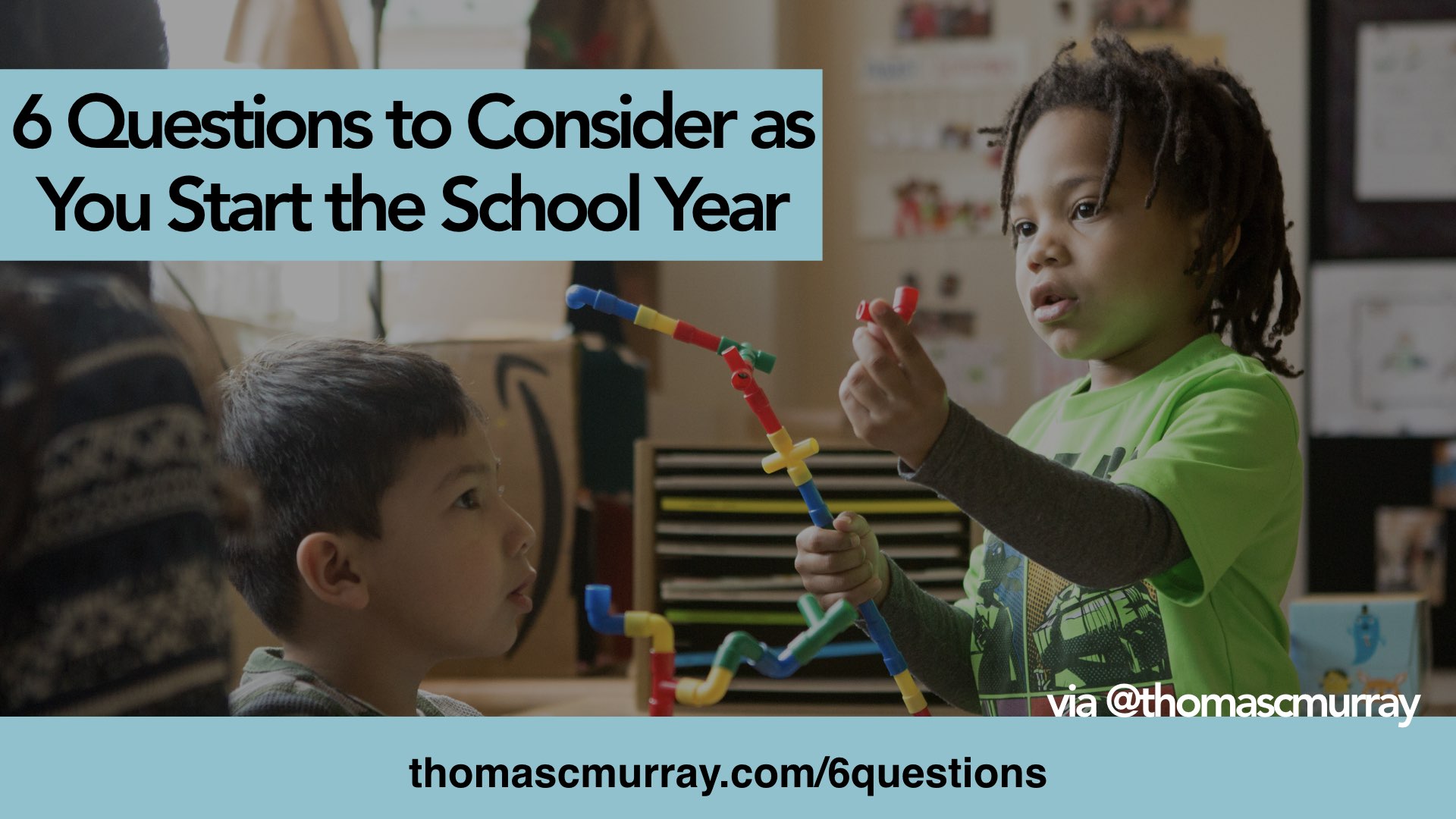6 Questions to Consider as You Start the School Year
It was August of 2000. I was about to enter my very first year teaching fourth grade in Pennsylvania. At 21 years old and a new college degree in hand, I thought I had a clue as to what it would take to be a new teacher. I had no idea that my first year teaching would be one of the most difficult and emotional years I'd ever have. My experiences that first year would change me for the rest of my life - both personally and professionally; experiences that I'll share when I eventually decide to write my next book.
During the summer leading up to my very first day teaching...
- I can remember spending countless hours setting up the classroom.
- I can remember two boys walking into the classroom that summer and asking, "Are you Mr. Murray?" Tommy and Timmy were the first two students of mine that I would ever meet.
- I can remember one of my mentors handing me my first set of units to be helpful; each a packet of worksheets that went along with the chapter 1 of the textbook.
- I can remember setting up the classroom space, outfitted with plenty of New York Giants and New York Mets gear, for me.
As I look back on my first year, I learned far more about kids - their needs - and what teaching was truly about, than I ever did in a college course or reading from a textbook. I failed countless times that year, and would fail countless times every year thereafter as well. Yet, each year, I learned more about what was truly important.
My mindset shifted:
from content and curriculum to student learning experiences;
from the notion of it being "my classroom" to it being "our classroom;"
from failure being bad, to failure being part of the learning experience;
from skills for a test, to skills for life;
from teaching being about content, to teaching being about relationships;
...to name just a few.
17 years later I find myself working with school leaders from coast to coast. It gives me the unique opportunity to highlight my own failures while challenging the thinking of those that currently lead schools. After facilitating a large number of admin retreats, leading conference sessions, facilitating multiple Future Ready Institutes, and keynoting many conferences this summer, my heart keeps coming back to one thing to start this coming school year. I think part of it comes from having the opportunity to connect with Daniel Pink at the Model Schools Conference and listen to him to discuss research leading up to his new book - WHEN: The Scientific Secrets of Perfect Timing. We often focus on the what or the how, but Dan takes a deep dive into the WHEN things occur. Dan takes the research behind beginnings, midpoints, and endings and shows how vital each one is - from relationships to experiences. He also points to a direct overlap to our work as educators. How we begin the school year was one example that stuck with me.
In reflecting on my own experiences; from vast failures to many team successes, I challenge teachers heading back this school year to reflect on the following questions. I do so not to pretend that I had it all together in the classroom or had any of these mastered when I taught. I certainly didn't. I pose these questions to help us create the types of learning experiences our students need and deserve.
6 Questions to Consider as You Start the School Year
1. What will you do on day 1 that has your kids running back on day 2?
When I think about my very first day teaching, it was filled with assigning classroom numbers, handing out textbooks to be covered, filling out index cards, going over my classroom rules, etc. I can't imagine that my students went home day 1 dying to come back on day 2. I completely changed that year 2, so the first few days were about team building, relationships, getting to know our class team, etc. What a difference a year made for me... and for my students.
If you're the chemistry teacher, why not start blowing things up day 1? If you're the biology teacher, why not start day 1 with a dissection? If you teach fourth grade, why not take the first few hours together to be outside doing team building experiences?
When your students get home from the first day of school, at what point will they stop talking about it? What will they share when they get home? Simply put, spending day 1 on logistics, rules, and book covers, won't lead them to run back to you on day 2. Building relationships and creating dynamic learning experiences, however, will.
2. If students saw the classroom design before the first day of school, what learning experiences would they expect?
My first day teaching opened with desks in rows, my large teacher desk up front, and a room set up that clearly would lead to me standing up front to disseminate information. The classroom layout clearly indicated that I would be transferring the information to the students as they sat, desks in rows, islands unto themselves.
Learning Space design, a topic that Eric Sheninger and I dive into heavily, from research to practice, in our new book, Learning Transformed, has a profound impact on the way students learn. Research indicates that design empowers, or hinders, learning. What research are you using to design the classroom space? If we are going to create a generation of problem solvers, collaborators, critical thinkers and doers, and ultimately those that can create new cures, find new solutions, and solve tomorrow's problems, isolating them for 52 minutes at a time will not lead to the desired outcomes.
Ultimately, what does the learning space design indicate about your beliefs about teaching and learning?
3. How will you make learning personal and authentic for your students?
I can guarantee that no child I taught can remember a single worksheet I handed out as a classroom teacher. Yet, to this day, I'll hear stories about many of the experiences that they had; those things that they remember almost two decades later. Why the difference? Dynamic, authentic experiences are personal in nature. Worksheets are not. Simply put, the brain responds differently to each and I believe one's heart responds differently as well.
This coming year, what experiences will bring awe? What experiences will they run home and tell their family about? What experiences will they remember years later? What experiences will change their outlook on a topic? What experiences will quench their thirst for learning? Which experiences will not?
4. How will you take ownership of your learning?
If we could sum up our research for Learning Transformed on effective professional learning in one word, it'd be ownership. As a teacher, how will you own your learning this year? What areas do you want to grow professionally? What areas do you need to grow professionally? What's your plan to do it?
I've never met a teacher who doesn't want or push students to take ownership of their own learning. However, I've met teachers that feel it's their district's responsibility for them to grow professionally - not theirs. Those two thoughts are at odds. If we expect students to own their learning and see it as their responsibility to grow, we as educators must have the same mindset. The fact is that each of us has a dynamic skill set and a variety of need areas; yet each are different. It's part of what makes us unique.
Does your attitude about your professional growth mirror the attitude you expect your students to have?
5. How will you help build a dynamic, kid-centered school culture?
Who is responsible for school culture? Every adult in the building, that's who. I truly believe that every adult in a building either builds a positive culture, or tears down the culture, one step at a time, one day at a time. When you walk into the faculty room, do you build the energy up? Or do you suck the air right out?
When I think about the attitudes and mindsets of adults in a school building, I think about it very differently than I did my first year teaching. Then, I'd avoid a few colleagues who seemed to always find a problem for every solution, gripe nonstop in the faculty room, and always seemed to have issues that caused eye rolls or huge exhales as they sat down for lunch. Today I realize that the mindsets of those people, even if only a handful of people in the building, negatively impact the building culture AND kids. The flip side, as seen with the countless people who I worked with that were culture builders, is the impact that those with positive, empowering mindsets do have. Those teachers are life changers. Those are the teachers that leave a legacy. Those are the teachers I want for my very own children.
6. How will you intentionally build relationships with and between your students?
What if you took the first few days of school to focus on building culture and relationships? What if the first few days were filled with team building experiences? What if the first few days were spent previewing some of the best learning experiences that the students would have that year? How would such a mindset then impact your relationships with students?
What's fascinating to me is that the more our nation has focused on a testing culture, which has raised the "we don't have time for..." mantra, the less we as educators often feel we can do to build relationships and culture in our classrooms. I fully understand where this mindset comes from, and that quite often poor leadership in a school reinforces these thoughts. However, this notion is completely counterintuitive to brain research, and all that we know about effective teaching and learning. Without an effective relationship, effective learning will be near impossible.
When I spent a lot of time on rules and management tasks during the first few days of year one, I found myself doing so countless times throughout the year. When I invested time in relationships and team building early on during year 2 and every year after, classroom expectations took care of themselves. Relationships and culture lay the foundation to the very best classrooms.
There are times where I wish I could go back to my first year teaching as there are so many things I wish I did differently. What were the first impressions of those families that trusted me every day to love and care for their hearts outside their body that walked into my classroom each day? What did my communication with them indicate? What could I have done differently so that every child left, every day, knowing that they were loved and cared for while in my classroom?
Finally, teachers, you should be commended for the countless hours you've already put in preparing for the upcoming year. In working with so many educators across the country, I see firsthand the passion in your souls and the love in your hearts. But as you enter your first few days, I beg you... Let's not forget that we are here first and foremost to love and care about the kids that we serve. Everything else is secondary.
Go get it. Our kids need you.
All for the kids we serve,
Tom


